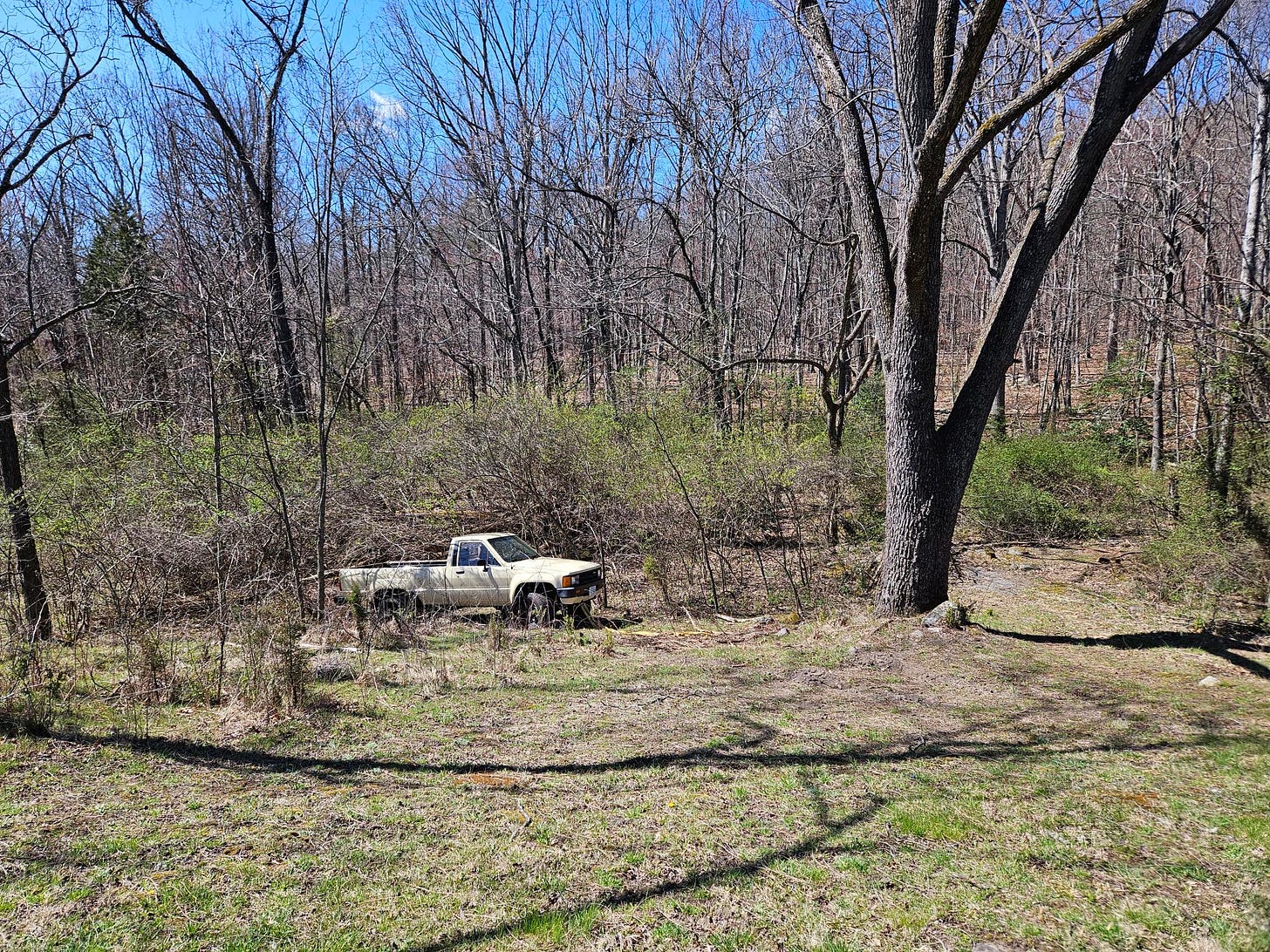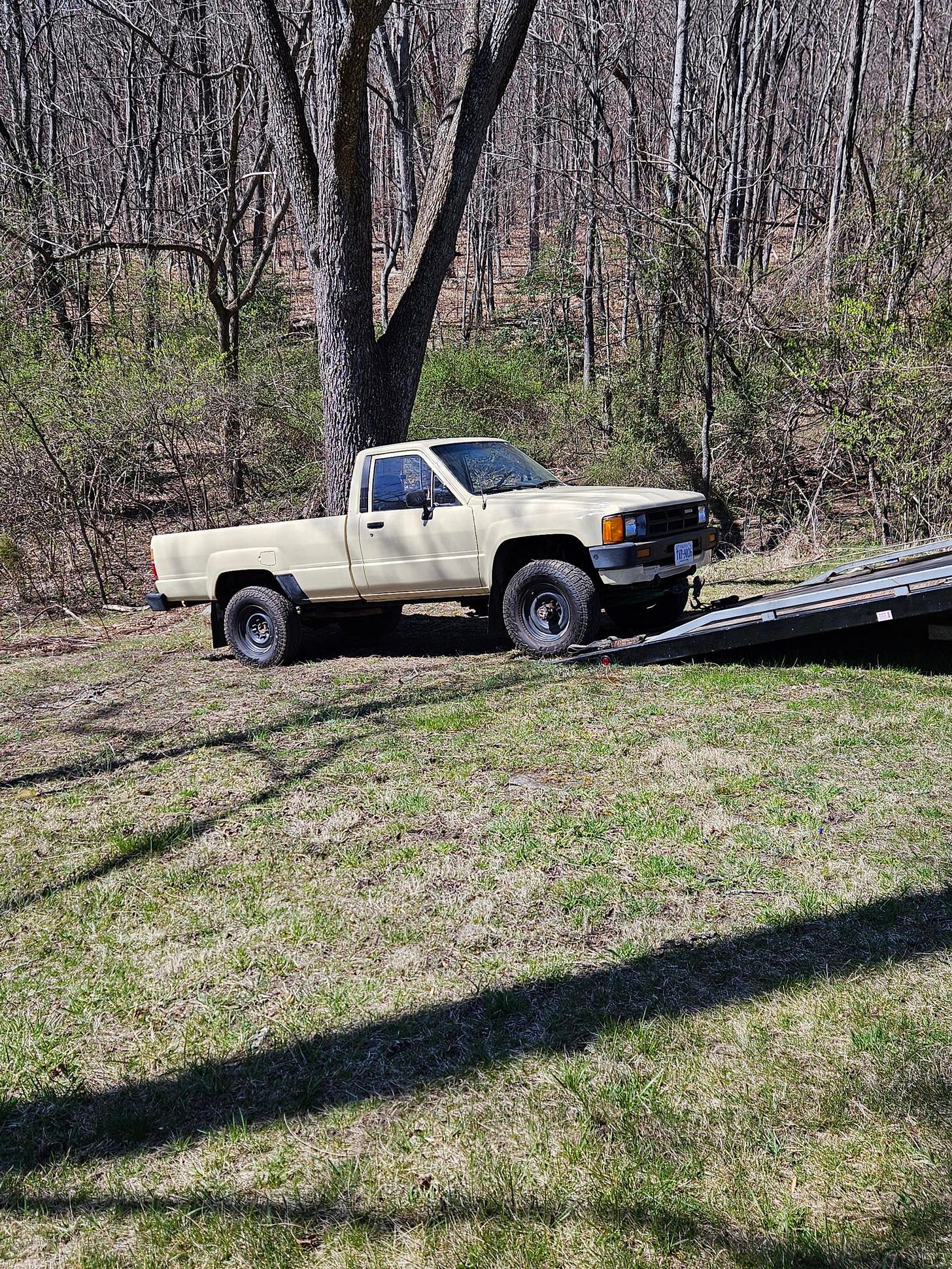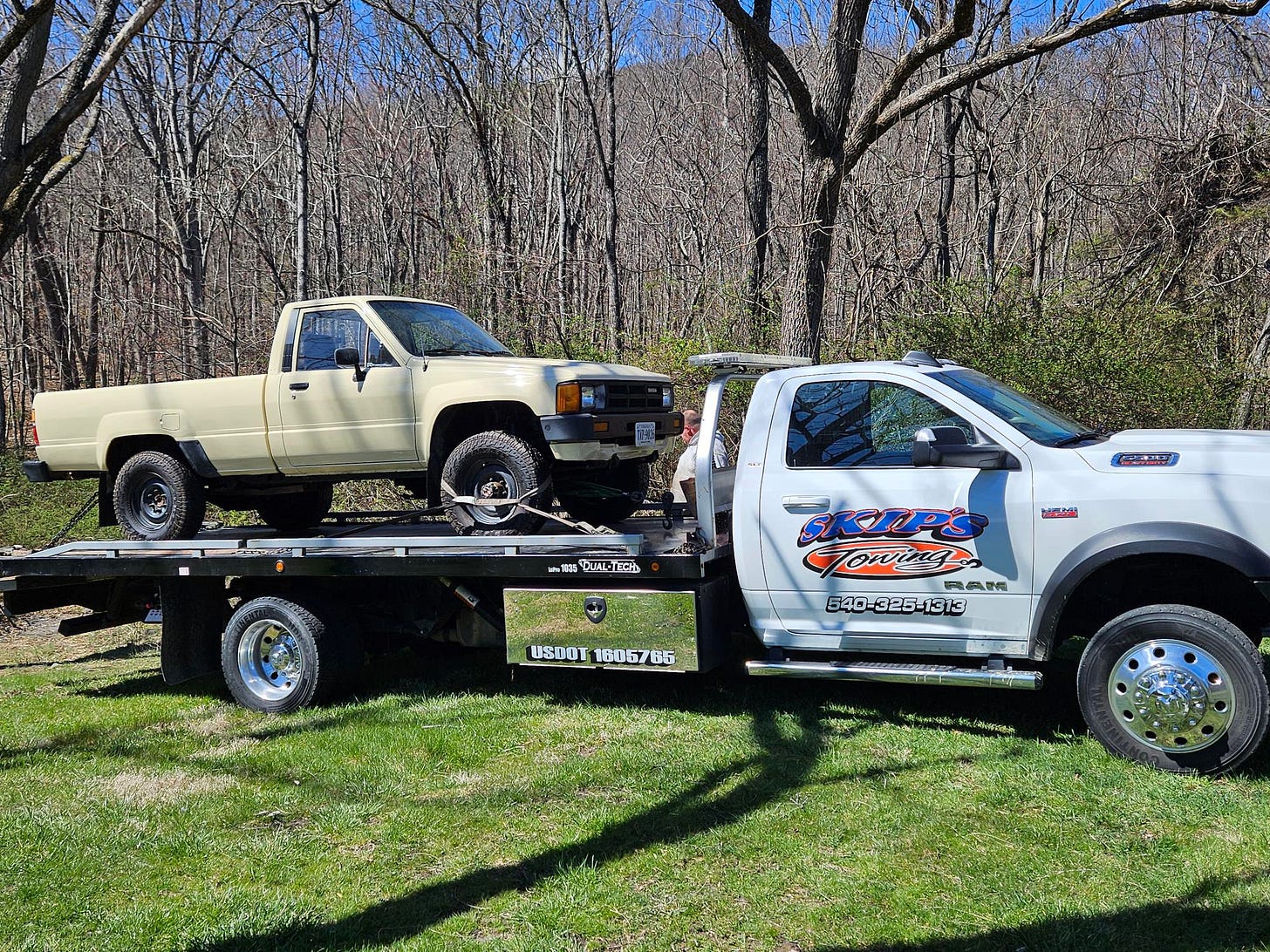Last Saturday, I was out at the cabin doing work outdoors. I had been working with my son to cut up fallen trees with a chainsaw and clear them from a trail down into the woods and the fire path on the backside of the property. When we finished that work, I decided to fill the back of my utility pickup truck with mulch to place on the trail. We had a large pile of mulch from some trees we had removed, but lugging the mulch one wheelbarrow at a time across the pasture and down a hill did not sound fun. It made more sense to me to fill the bed of the pickup truck and then back it down the hill to the path into the woods and shovel out the mulch there onto the path. I had mentioned this idea to my son a couple of weeks prior, and he did not think it was a good idea. We discussed it in passing, and I still thought that with 4-wheel drive it would not be a problem for the truck to come back up the hill.
I brought the truck over to the mulch pile and started shoveling. Once the truck bed was pretty full, I climbed in the cab and drove over to the hill. I lined up the truck to back down the hill to the start of the path. As I started backing up, I realized that I was lined up incorrectly—I was heading towards the wrong side of the large walnut tree on the hill. I stopped, got my bearings, and tried to move back up the hill to get the line correct. This moment was when I realized there was a problem. The truck was not climbing the hill.
I tried a few times to get moving, but at the angle the truck was sitting at it was not working. I put on the parking brake and got out to see what was going on. One problem was that I had just backed over a rock and it was now blocking my front left tire. If I was going to move forward, the truck would have to first push me over the rock. I also noticed that other tires were slipping in the grass and dirt. I decided that backing the truck slightly from the rock, and also trying to turn the truck parallel to the face of the hill would increase my chances.
Initially, there was no problem moving backwards. Gravity continued to pull the truck down the hill. But relocating did nothing to improve my ability to move forward. At some point in the process, I had engaged the 4-wheel drive but that did not seem to make a difference. I made one last attempt to get in a better position and the truck slid into a tree. Crunch. That was the end of the driver-side mirror. The truck was now wedged up against this small tree. I abandoned my efforts to get the truck out at this point.
This is the point at which my wife arrived at the property with the dogs. As I walked back up to the house, I told her that I had “trashed” my pickup truck. She looked at me in shock—”What??” We turned and walked to the top of the hill. When she saw the truck, she started laughing. “I expected to see the truck upside down. You didn’t trash it!” She went on to tell me that as a child, she used to ride with her father when he went “mud bogging” in their 4-wheel drive Bronco. Apparently, he tore the gas tank off the truck one time!
After a little discussion, I set off for town to see if I could buy a towing chain. The drive into town was stressfull as I was still processing the adrenaline and stress from the incident. I probably spent 30 minutes walking in circles in Lowe’s trying to find a tow chain. I texted my wife that I was not finding what we needed. She responded, “Don’t be sad. Stupid stuff happens.”
That was what I needed to get over myself and calm down. Then, just when I was about to give up, I saw what I was looking for on the shelf—a 20 foot town chain rated at 4,000 pounds. I returned to the scene of the crime.
Despite our best efforts to tow the little truck out, it did not seem to have the power or torque to make forward progress. I finally gave up and decided to call a tow truck next time I was out there. I ended up scheduling the tow truck to come out Wednesday afternoon.
As the day passed, the adrenaline and stress started to go away. My wife’s reaction and encouragement right away had broken the worst of it, but it took a few hours for me to calm down. I had to acknowledge that my 28-year old son had been right—backing the truck down the hill had not been a good idea. All in all, I decided that the best path forward was to embrace my humiliation and laugh at myself! Later that afternoon, after a glass of wine, we had a good laugh when I pulled up the song “Bad Day” and played it.
The next couple of days at the gym, I had to accept the good-natured teasing I received about “trashing my truck in the woods.” I met the tow driver Wednesday at noon. He hooked up the truck and winched it out of the woods. Getting it on the flatbed was not difficult for him.
After the truck was on top of the tow truck, I was standing talking to the driver. He was telling me that he had owned one of these trucks and regretted selling it. He thought it was a great little truck and could not understand why it could not get back up the hill in 4-wheel drive. We were standing next to the driver side front wheel talking. After he said that, he turned around and started looking at the axle cover on the wheel. He reached over and grasped a red dial on the face of the cover and rotated it clockwise. “You didn’t lock the wheel. That’s why the 4-wheel drive wasn’t working.” He walked around to the left side and discovered the same thing. As if I did not already feel stupid enough about getting my truck stuck at the bottom of the hill, by now I was definitely feeling double stupid. I had never heard of such a thing.
😑
Later, I learned from my wife that she recalled her father having to lock the wheels of the Bronco if they wanted to be in 4-wheel drive in the mud. At least now I know how to operate the 4-wheel drive on my little truck.
Much like my earlier experience that led me not to ask God to assign my Lenten penances, I have learned over the years to be careful about praying for humility. It is not that I am humble—it is that praying for humility often leads to humiliation. This meditation from the book Divine Intimacy captures this concept well:
Many souls would like to be humble, but few desire humiliation; many ask God to make them humble and fervently pray for this, but very few want to be humiliated. Yet it is impossible to gain humility without humiliations; for just as studying is the way to acquire knowledge, so it is by the way of humiliation that we attain to humility.
As long as we only desire this virtue of humility, but are not willing to accept the means thereto, not even are we on the true road to acquiring it. Even if in certain situations we succeed in acting humbly, this may well be the result of a superficial and apparent humility rather than of a humility that is real and profound. Humility is truth; therefore, let us tell ourselves that since we possess nothing of ourselves but sin, it is but just that we receive only humiliation and scorn. If we were really convinced of this truth, we would find it very just that all should humiliate us, treat us without consideration, and despise us. In fact, what honor and consideration does one deserve who has offended his Creator, when a single sin–even a venial one–is more deplorable and worthy of more contempt than the most miserable earthly condition, the poorest and lowest estate? The saints were so firmly convinced of this truth that they never found the humiliations which came to them too painful; they considered them, on the contrary, always less than they deserved. “I never heard anything bad said of me,” said St. Teresa of Jesus, “which I did not clearly realize fell short of the truth. If I had not sometimes–often, indeed–offended God in the ways they referred to, I had done so in many others, and I felt they had treated me far too indulgently in saying nothing about these” (Way of Perfection, 15).
Bear your humiliations patiently, for man is tried in this crucible as gold in the fire (cf. Sirach 2:4,5). If we feel the weight of our pride and wish to be rid of it, we must accept humiliations calmly–through them the Lord will crush our pride.
St. Thomas Aquinas likewise teaches that “Sometimes again we may make a virtuous use of humiliations as a medicine. Thus if anyone’s mind is prone to undue self-exaltation, he may with advantage make a moderate use of humiliations, either self-imposed, or imposed by others, so as to check the elation of his spirit.” (Contra Gent., bk. III, 135).
A contrite and humbled heart, O God, thou wilt not despise. (Psalm 50:19, Douay-Rheims)
All of us battle pride in one form or another. Pride does not lead to peace of heart. Rather, our wounded pride gives rise to anger, agitation, frustration, envy or depression. The path to true inner peace in Christ, however, comes through the virtue of humility. “Humility is to walk in truth.” (St. Teresa of Avila)
This Lenten season, as we meditate on the Passion of our Lord Jesus Christ, let us pray for the grace to calmly accept the humiliations and contradictions in life. And remember that it is ok to laugh at yourself! God loves you.
Eric A. Welter is an employment lawyer and trial attorney with a long-time devotion to intercessory prayer. He is a Catholic Christian who has been involved with intercessory and healing prayer ministry for over twenty years.




St Thomas Aquinas helps us with My PHD and wifes undergrad degree.
Pride thank you for some Pax peace on it. I struggle but your follies with truck.
Helps me too.